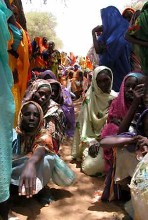Insecurity cuts off 360,000 of Darfur’s needy-WFP
By Opheera McDoom
NYALA, Sudan, Dec 14 (Reuters) – About 360,000 needy people in Sudan’s Darfur region are out of reach of the World Food Programme because of fighting, officials said on Tuesday.

|
|
WFP food distribution at Diesa, Darfur. (WFP). |
WFP has previously said insecurity in North Darfur state has cut off 200,000 people who fled their homes. WFP officials now say recent fighting in South Darfur state has also put a further 160,000 people in need out of reach of food supplies.
“Because of insecurity we’ve been unable to reach seven locations, that’s about 160,000 people trapped that we cannot reach due to insecurity,” said Asaka Nyangara, head of WFP’s programme in Nyala, the capital of South Darfur.
“Within the past one week there’s been a lot of fighting in South Darfur,” he said, adding that in some areas military intelligence had advised them not to enter whereas in others drivers had told them it was too dangerous to venture further.
Nayangara’s programme covers hard-to-reach parts of West Darfur state as well, a total of 926,000 displaced people and other civilians affected by a 22-month-old rebellion in the remote area of west Sudan.
After years of tribal conflict over scarce resources, Darfur rebels took up arms accusing Khartoum of neglect and of using Arab militias, known as Janjaweed, to attack non-Arab villages.
Khartoum admits mobilising some militias to fight the rebels but denies any links to the Janjaweed, calling them outlaws.
The homeless in some camps around Nyala said the Janjaweed attacked anyone who left the camp boundaries. The tribal chief of Otash camp said some homeless were attacked on Tuesday.
“The Janjaweed are moving around in all the areas near our villages,” tribal chief Mohamed Ahmed Abdel Rahman said. “Even here the people cannot leave the camps now without being attacked.”
WFP aims to feed about 1.6 million people in Darfur in December. U.N. Secretary-General Kofi Annan said last week more than 2.3 million people were in need because of the fighting in the area the size of France with just over six million people.
The United Nations calls Darfur one of the world’s worst humanitarian crises and has threatened Khartoum with sanctions if it fails to stop the violence, which the United States has called genocide.
MILITARY OPERATIONS
Sources in the aid community in Darfur said government forces were on the offensive to try to stop rebel attacks on Nyala and the road to El-Fasher, the capital of North Darfur and the only supply route connecting Nyala to Khartoum.
The sources, who asked not to be named, said an Antonov plane last week bombed Marla, a town south of Nyala. They said the attack was confirmed privately by African troops monitoring a shaky ceasefire, but African monitors declined to comment to the press.
The sources said Darfur residents reported several other recent aerial bombardments. Independent verification is difficult to obtain in the remote region.
Government officials had no immediate comment. In the past, officials have said the government does not use planes for aerial bombardment but would be ready to investigate any reported attacks.
Aerial bombardment would be a violation of the April ceasefire between the government and rebels, and of security protocols signed in November.
The main Darfur rebel group’s leadership has boycotted African Union-sponsored talks in the Nigerian capital Abuja, which the rebels have suspended. Rebels accuse Khartoum and Janjaweed of conducting military operations, creating a bad atmosphere for talks.
